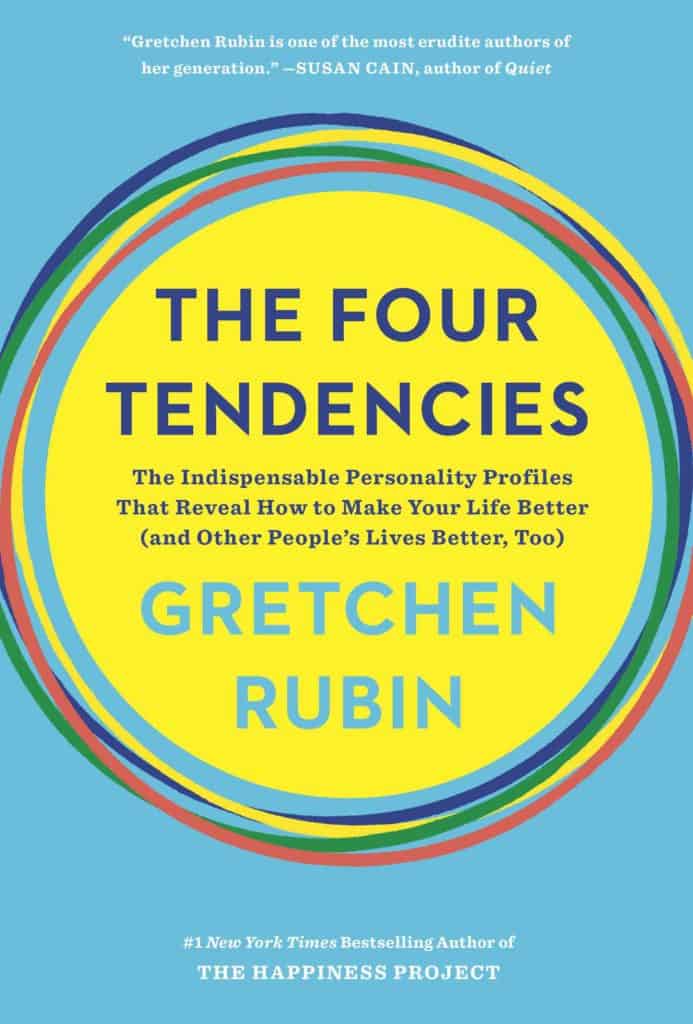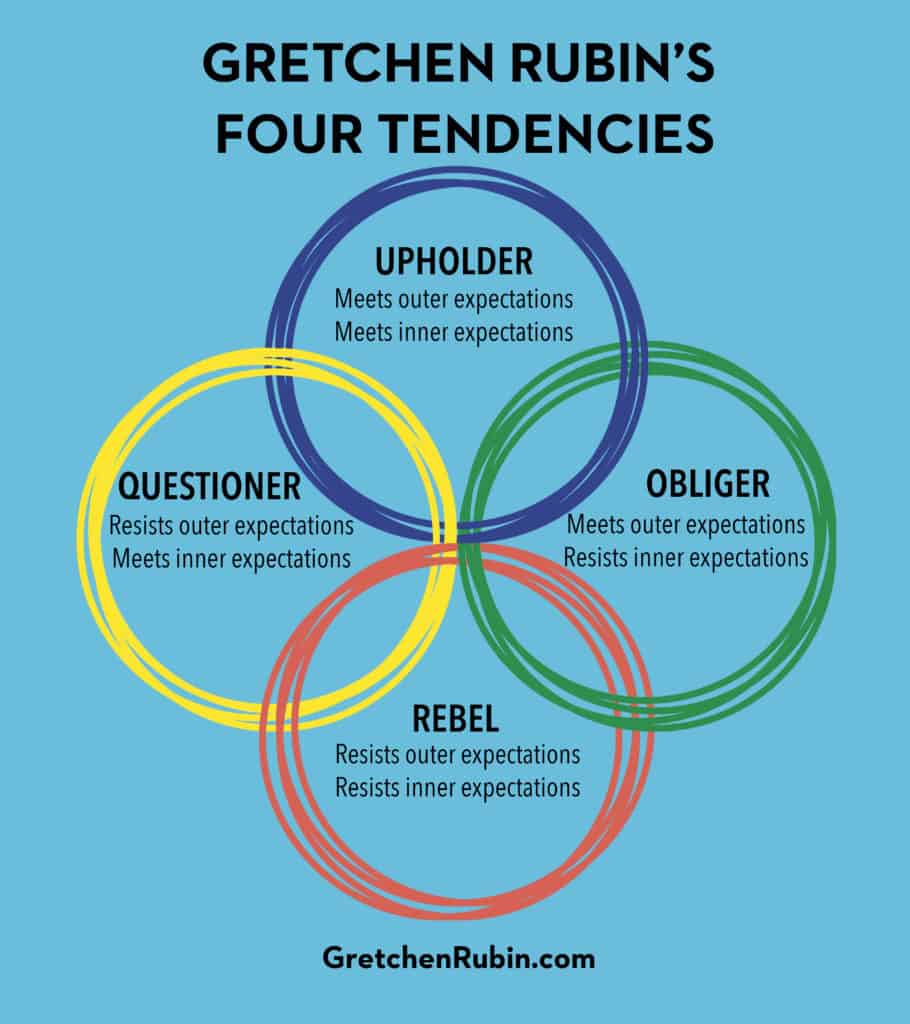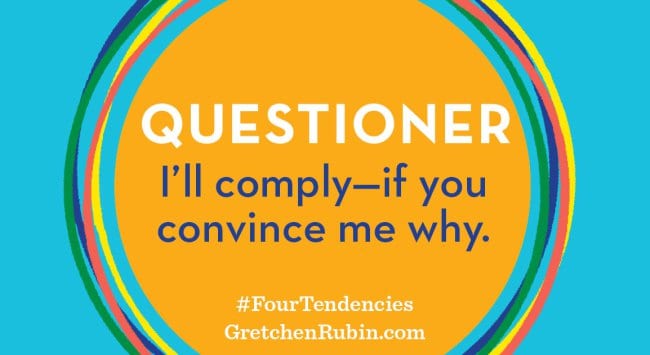The Four Tendencies framework will help you better understand yourself and your kids – and give you insight into how to fix motivational issues in your homeschool!
Did you ever wonder why some kids are self-starters and don’t need much motivation to finish tasks, while others need daily or hourly check-ins from mom to complete an assignment?
Did you ever wonder why some people seem put off by others’ expectations of them, while others crave being needed?
{This post contains affiliate links. That means if you purchase from these links, I may earn a small commission. Please see my disclosure policy.}
Gretchen Rubin is a New York Times Bestselling author and her newest book, The Four Tendencies, offers incredibly practical insight into your own personality and those you love. For those of us who homeschool our kids, many of whom are not clones of ourselves, this insight into why our kids do what they do is brilliant.
And the insight it gives to you (the adult) about yourself is equally helpful. I thought I knew myself pretty well, but some aspects of my personality that bothered me (like, why do I have analysis paralysis so much?) made total sense when I figured out my tendency (Questioner!).
So, the main question that this framework addresses is this:
“How do I respond to expectations?”
Based on your responses, you are an Upholder, Questioner, Obliger, or Rebel.
(Go take the short online quiz that will tell you which personality profile you are.)
Once you understand the main characteristics of each tendency, you will know how to motivate your homeschooled kids better. And the parts of their personality that frustrate you will probably frustrate you less because you will now know why they do what they do.
What I love about the Four Tendencies Framework is that each personality is categorized according to how they respond to expectations – outer expectations and inner expectations.
Don’t we see this all the time as we homeschool?
Some kids don’t need the outer accountability to be successful, some crave it, some rebel against it, and some need time to understand it.
So, what exactly do these four tendencies look like in real life? And in particular, in the life of the homeschooler?
UPHOLDER
Meets inner & outer expectations
“Discipline is my Freedom”
Homeschooling an Upholder
PROS
- self-motivated
- wants to meet your expectations
- keeps track of schedules
- loves routine
- doesn’t need as much supervision
- takes initiative to complete assignments
CONS
- can’t let go of expectations
- needs clear expectations
- can’t handle sudden change
- can become angry or defensive with mistakes
The Upholder Homeschooled Child will work hard, embrace routine, and take initiative because of your expecations and their own.
However, don’t exaggerate in order to get compliance because they already take expectations too seriously.
It’s easy for an Upholder to lock on to an expectation and spend tremendous energy and time living up to it, even if it’s not something that he or she wants to do – or even a good idea. A casual comment like “You should enter the spelling bee” might set off an enormous and unintended chain reaction. (page 53)
QUESTIONER
Meets inner expectations / resists outer expectations
“I’ll comply – if you convince me why”
Homeschooling a Questioner
PROS
- once they’re convinced, it’s easy for them to meet expectations (so spend time explaining the rationale of the schedule and curriculum choices)
- likes customization (perfect for the flexibility that comes with homeschooling!)
- want to gather information
- “just try it” can work well
CONS
- doesn’t like arbitrary rules
- can go against authority if the expectations seem artibrary
- doesn’t follow rules without understanding explanation
- might refuse to work because it doesn’t meet inner expectations, or is seen as pointless
- “because I said so” doesn’t work
When homeschooling the Questioner Child, it is helpful to find the reasons or questions behind the child’s refusal to follow through, then address them. This kid needs convincing arguments, reasons, and explanations. Yes, they will have a hundred questions, but you need to try to satisfy this need to understand
Homeschooling may be a good choice for the Questioner Child who tends to balk at convention because you are free to answer his questions regarding what’s required and expected. This questioning would typically not be tolerated in a traditional classroom where all are expected to fit into the mold and status quo.
So when a Questioner child questions an assignment or expectation, a teacher or parent would do well to provide a thoughtful justification. If a Questioner student asks, “Why do I need to know about ancient Mesopotamia? This will never be of any use to me,” a teacher might respond unhelpfully, “This is what we’re studying now, so get with the program,” or helpfully, “You’re learning about Mesopotamia, true, but this assignment is teaching you much more. You’re learning how to analyze complex material quickly, how to pull essential ideas out of a text, how to take notes efficiently, and how to explain ideas in your own words. These are important skills that will serve you well.” (pages 92-93)
OBLIGER
Meets outer expectations / resists inner expectations
“You can count on me, and I’m counting on you to count on me”
Homeschooling an Obliger
This is the largest tendency. However, it can also be hard to spot this tendency in children. The Upholder and Rebel extremes are much easier to see in young kids.
PROS
- succeeds with supervision and deadlines
- needs accountability – give it to them
- parents need to encourage and support rather than nag
- fulfills commitments (to others)
CONS
- can try so hard to please others that they burnout or get overwhelmed
- external pressures can create great stress
- can do for others what they can’t do for themselves
- harder time meeting inner expecations, so can be taken advantage of easily
When homeschooling an Obliger Child, you need to create external systems of accountability. This may be in the form of a Co-op class, an online class, or possibly a workbox system or definite schedule. You also need to monitor their progress. If they know you will be checking on them, they are more likely to comply.
Obliger children – like all Obligers – respond to accountability. If an Obliger child is supposed to practice the piano, it would be helpful to keep a chart of practice times, which the teacher or parents would review with the child. Gentle reminders help, too: “It’s 4:00, time to practice.” Or the teacher should explain, “I can tell if you’ve been practicing or not.” (page 147)
REBEL
Resists outer & inner expectations
“You can’t make me, and neither can I”
Homeschooling a Rebel
PROS
- consequences are hard to enforce long-term
- find Rebel interests and applaud them
- choice and freedom vs. duty and orders
- will do it if its enjoyable
- challenges motivate them
CONS
- can be a challenging personality
- tend to resist instruction
- telling them to do something can be counterproductive (they may do the opposite of what we want for them)
- they want to choose their own way
- motivated by identity
- don’t like to feel trapped
When homeschooling a Rebel, it is helpful to be clear with the situation, let them know the natural consequences, then leave them with the choice.
For example, “If you don’t complete your assignment, you can’t get credit for this class, then you will have to work on it during your summer break”
You can offer help: “Would you be able to complete this assignment if I organized the supplies for you?” or “Would you enjoy this book more if we read it together?”
I loved that Gretchen said that the Rebel kids tend to have a close relationship with grandparents, so that is a great plus in working toward motivating them.
What do you think? Isn’t the Four Tendencies framework eye-opening? Don’t forget to take the quiz, buy the book, and put this knowledge into practice in your homeschool. It’s been super helpful in our homeschool already.
So, which of the Four Tendencies are you? (I’m a Questioner all the way!) Comment below! And download a handy infographic summary of the Four Tendencies.





